Lecturer in Games Design
Faculty of Arts, Science and Technology
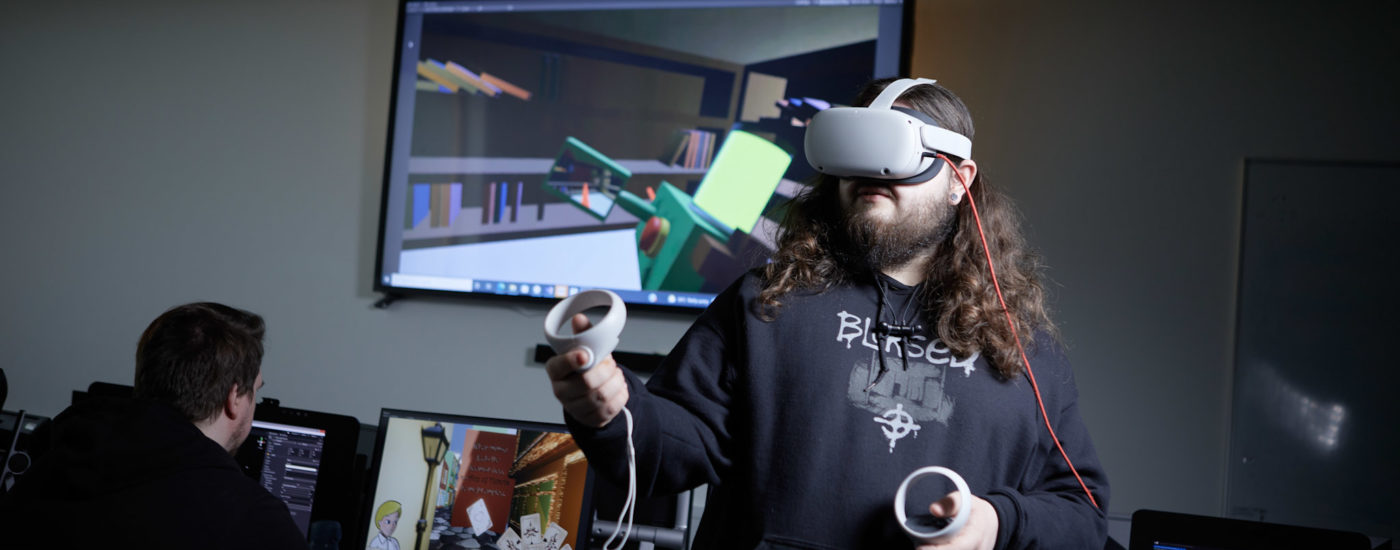
Games Design BA (Hons)
- Home
- Courses by subject
- Games Design BA (Hons)
Key Facts
-
UCAS Code
BA: I620
BA with Foundation: I622 -
Level
UndergraduateUG BA (Hons)
-
Duration
Full Time: 3 years
Full Time Foundation: 4 years
-
Starting
September
-
BCC at A-Level or,
DMM at BTEC -
Full Time: £9,535
Integrated Foundation Year: £9,535 -
Full Time: £15,700
Integrated Foundation Year: £15,700 -
Waterside
Updated 27/03/2025
Updated 27/03/2025
Get in touch
For questions regarding study and admissions please contact us:
UK STUDENTS ENQUIRIES
study@northampton.ac.uk
0300 303 2772
INTERNATIONAL STUDENTS ENQUIRIES
Overview
The BA Games Design degree at the University of Northampton is a course created to give you the opportunity to develop the skills required to design and build games for multiple platforms. Unlike other game design university courses, our programme encourages you to explore what the market is looking for and build solutions which meet the market’s needs for the next big game. The object of this course is to give you the opportunity to gain the experiences needed to start your professional journey after graduation.
Highlights
- Get experience in the whole process of game design with other related university courses.
- Guaranteed paid internship with the Northampton Employment Promise
- HP Laptop and software included with this Games Design course. Terms and Conditions apply.

Example of the computer suites for Game and Animation courses.

Example of the type of academic and group discussion that takes place in Animation and Games classes
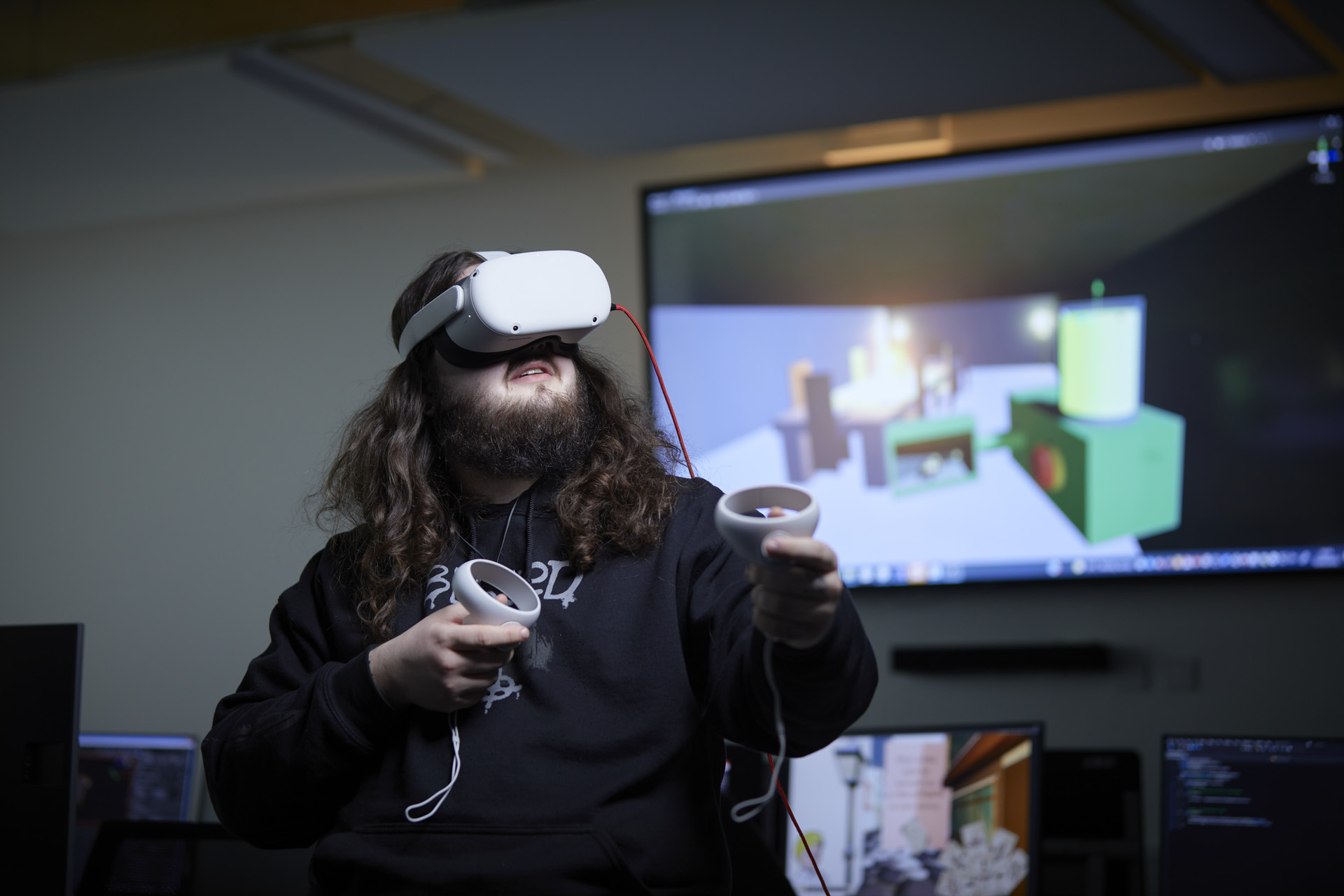
Student using a virtual reality headset, as part of their class work during Animation or Games.
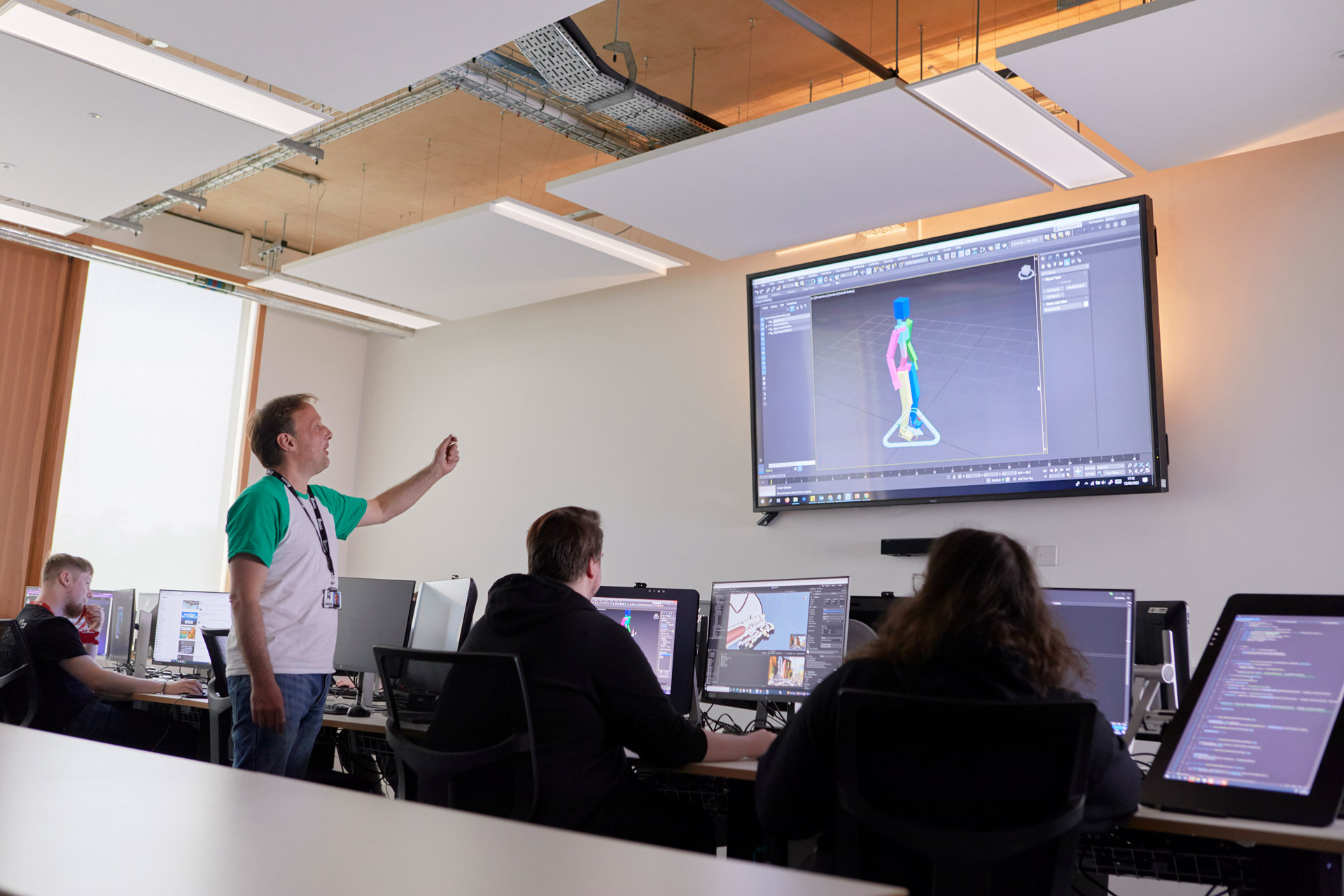
Class session, where academic is teaching class about animations with a visual demonstration.

Students use a mixture of software including touch screens for their design work.

Academic talking to three students during a class session, using the computers and real work for discussion

Example of the computer suites for Game and Animation courses.

Example of the type of academic and group discussion that takes place in Animation and Games classes

Student using a virtual reality headset, as part of their class work during Animation or Games.

Class session, where academic is teaching class about animations with a visual demonstration.
Entry Requirements
A typical offer for this BA Games Design degree could be:
- BCC at A-Level or,
- DMM at BTEC/Cambridge Technical or,
- Pass (C and above) at T Level
You will be expected to have achieved GCSE Mathematics (or equivalent) at grade C/4 or above. The University of Northampton welcomes international applicants and applications from students with a range of non-traditional educational or professional qualifications.
We welcome applications from students with a mix of A levels and BTEC/Cambridge Technical qualifications.
-
Admission to this foundation course is normally:
- DEE at A Level or,
- MPP at BTEC or,
- Pass (D or E) at T Level
However, we would also like to hear from you if you have professional or industry experience instead, a range of other qualifications or self-developed subject knowledge that relates to the course you wish to study.
-
Those who do not have English as their first language will need to demonstrate that they meet the minimum English language requirements.
- IELTS 6.0 (or equivalent) with a minimum of 5.5 in all bands
for study at undergraduate level
For information regarding English language requirements at the University, please see our IELTS page.
- IELTS 6.0 (or equivalent) with a minimum of 5.5 in all bands
Upcoming Discovery Days
Discovery Days give you the best experience and insight to courses, people and facilities that interest you. Make your choice easier and come meet us.
Course Content
-
On the University of Northampton Games Design BA (Hons) degree programme, you will be taught in a way that encourages creativity and gives you the opportunity to learn from those with industry experience.
Through a series of practical modules, you will be given the chance to explore the theory of game design through to the development of quality prototypes for mobile, PC, and console.
Key topics which will be covered include:
- Narrative theory
- UX/UI
- Introduction to Programming
- 2D & 3D Skills
- Engine Development
- Design Management
- Professional Practice
Through our other games courses students at the University of Northampton have had work published in leading magazine, appearing on TV, exhibited at major gaming events, and have entered national/international Game Jam Competitions.
Please note the modules shown here relate to the academic year 24/25. The modules relating to the academic year 25/26 will be available from June 2025.
-
-
Group Game Project: Fundamentals (20 Credits)
Module code: CSY1077Status: CompulsoryThis module introduces students to group working practices within the context of a computer game development project. The module encourages the development of key interpersonal skills needed for collaborative work, such as communication, problem solving, respect and consideration of others, and identifying roles and responsibilities within a multidisciplinary group project.
-
Scripting for Games (20 Credits)
Module code: CSY1078Status: CompulsoryThis module introduces students to the key programming principles necessary to develop computer games through scripting. Students will apply these within the context of a game engine, exploring the development and application of algorithms, real-time assets, data management and interactivity within computer games.
-
2D Game Asset Production (20 Credits)
Module code: CSY1090Status: CompulsoryThe purpose of this module is to introduce students to the principles and technical skills used to create 2D digital graphics for video games and other creative industries, and to explore the creative processes required to produce their own digital assets to professional standards.
-
Level Design Principles (20 Credits)
Module code: CSY1094Status: CompulsoryIn this module students use level design principles within game engines to produce interactive game prototypes. Students learn the technical skills required to create effective `white box? designs for game levels, appreciating the importance of level design in the production pipeline.
-
3D Modelling for Gameplay Prototypes (20 Credits)
Module code: CSY1095Status: CompulsoryThis module introduces students to the technical 3D modelling skills and creative processes required to produce 3D models for game prototypes. Students develop their visual research and texturing skill set to produce bespoke assets which respond to market trends and audience requirements.
-
User Interface Design for Games (20 Credits)
Module code: CSY1096Status: CompulsoryThis module introduces students to the principles and technical skills required to create interactive and intuitive user-interfaces (UI) for computer games. Students will use industry-standard 2D software to produce UI graphics. This will involve using shape language, colour theory and composition in the context of visual design for screen-based formats.
-
Group Game Project: Fundamentals (20 Credits)
-
-
Narrative for Games (20 Credits)
Module code: CSY2056Status: CompulsoryThrough session based activities, learners will be guided towards developing an insightful knowledge into narrative design. Understanding how to use narrative engagingly within a designed medium. Within digital industry, this will involve learning narrative history, media theory, act structure, psychological principles and digital implementation skills that are necessary to create an engaging digital product.
-
Group Game Project: Advanced (20 Credits)
Module code: CSY2127Status: CompulsoryThis module develops students? professional collaborative skills and experience of the game development process when working in multi-disciplinary groups to develop a 3D digital game to a deadline. Students use effective communication methods, empathy and compromise, problem solving and organisation skills within the context of a computer game project.
-
Design and Development for Games (20 Credits)
Module code: CSY2131Status: CompulsoryThis module guides students towards producing working prototypes of digital games using approaches relevant in modern industry and understanding how to make a playable and entertaining game. Students will engage with design principles, iteration cycles, and practical software skills necessary to deliver an impactful game demo.
-
Human Computer Interaction for Games (20 Credits)
Module code: CSY2132Status: CompulsoryThis module introduces students to the underlying reasoning behind Human Computer Interaction with relation to game design and accessibility; Why games are built the way they are. In digital games, this might relate to the requirements of a game engine or target platform and most importantly, the end user
-
Games Production (20 Credits)
Module code: CSY2133Status: CompulsoryThis module guides students towards producing working finalised levels of digital games using approaches relevant in modern industry and understanding how to make an immersive and fully interactable game. Students will engage with user testing, build cycles, and refined software skills necessary to deliver an effective product.
-
Interaction Design for Games (20 Credits)
Module code: CSY2134Status: CompulsoryThis module develops learner?s knowledge of designing to enhance the overall player experience. Learners will implement essential user experience principles to enable the design of rewarding prototype gameplay mechanics. This will produce interactive experiences that meet the requirements of varying target platforms and most importantly, the player.
-
Narrative for Games (20 Credits)
-
-
Group Project 3 (Games) (20 Credits)
Module code: CSY3031Status: CompulsoryAs the final module of the Group Project series this module aims to place significant emphasis on independent learning, development and responsibility, through the creation of a social game following industry practices.The production process and design of the groups games, are student-directed and supported through a module supervisor in conjunction with some, tutor lead lectures.The games should demonstrate the understanding of the complete development life cycle (design through to publication), where the final submission should be aimed at appearing in the public domain.This game ought to be seen by the students as a ?marque product? worthy of appearing in their professional portfolio, to assist with gaining employment.
-
Design Innovation (20 Credits)
Module code: CSY3044Status: CompulsoryThe objective of the module is to encourage students to explore the potential of innovative or unconventional technology to construct genuinely new, interactive experiences.
-
Professional Practice in Games (20 Credits)
Module code: CSY3051Status: CompulsoryThe main aim of the module is to ensure students are fully aware of the needs and expectations of the contemporary digital industry through an understanding of its social, economic and cultural climate. The module aims to enable students to pitch projects in terms of concept and business models; establishing and maintaining a personal website; identifying trends and market possibilities; encouraging participation in competitions; developing presentation and self-promotional skills; making job applications and preparing for interview.
-
Art Director Portfolio, Final Major Project (60 Credits)
Module code: CSY4021Status: CompulsoryThe module integrates and draws together the various aspects of the programme gained during study at levels 4, 5 and 6.The main aim of the module is to ensure students are prepared for their first steps towards the industry, by allowing them opportunity to develop a body of highly polished work demonstrated and refined via regular critiques of work in progress.This module gives them opportunity to specialize on developing content for their portfolio. The work developed will be as close to industry standard and expectations, as feasible, and will be tailored towards the specific areas of the individuals interest such as; Concept Art, Environment Art, Animation, UI design etc.This module is to support through mentoring the individual students on their professional journey.
-
Group Project 3 (Games) (20 Credits)
-
At the University of Northampton, everything we do, from funded trips to paid internships, is to give you everything you need to make a difference when you leave.
If you join this full time Games Design degree at the University of Northampton, you will receive a laptop when your course begins*. The laptops are built to a bespoke custom specification ideal for use in the seminar room, collaborative group work or studying at home.
Whatever your ambitions, we’re here to help you to achieve them. We’ll support you to identify the skills you’re learning during your games design course, find your strengths and secure practical experience so that when it comes to applying for jobs or further study you’ll feel confident in standing out from the crowd. We’ve created the Northampton Employment Promise because we are so confident that if you focus on your studies and complete one of our awards you’ll be highly employable by the time you graduate. Putting you in a great position to secure employment or continue your studies.
To check out the full list of perks, visit our Student Perks page or dedicated International Perks page.
*UK fee payers only (see Terms and Conditions for further details).
-
The Integrated Foundation Year (IFY) offers a new and exciting route into studying for on the Games Design university course, attracting ambitious and driven students who are willing to learn and advance.
If you have non-standard qualifications or do not quite meet the admissions requirements we can offer you a fantastic opportunity to study a four year programme which includes an Integrated Foundation Year. The Integrated Foundation Year will help you develop the theoretical/practical and academic skills you need, in order to successfully progress to the full award.
The University of Northampton’s four-year courses will enable you to successfully follow the degree pathway of your choice while gaining essential study skills. The foundation year of your chosen degree will be studied on a full-time basis and is aimed at supporting the transition to higher education. Years two, three and four are then studied as a standard degree programme.
-
How will I be taught on the Games Design BA (Hons) degree?
All of the teaching and learning materials that you will need will be available on NILE, our Virtual Learning Environment. Most of the software you will be using on this course is free to download (except for ZBrush and Substance).
Are there any specialist facilities and features on the Games Design course?
- Based at the University’s brand new state of the art campus, Waterside, BA Games Design students will be using some of the most up-to-date games development software like that of Substance, Unity6, UE5, Z Brush, 3DS Max, and the Adobe Creative Suite.
- The University of Northampton is an academic partner of Unreal Engine, this means we are an official training site for UE4.
Worried about student finance?
Get all the info you need ahead of time, before you can apply for funding in Spring on our fees and funding pages.
Fees and Funding
2025/26 Tuition Fees
- UK – Full Time: £9,535
- UK – Integrated Foundation Year: £9,535
- International – Full Time: £15,700
- International – Integrated Foundation Year: £15,700
Fees quoted relate to study in the Academic Year 2025/26 only and may be subject to inflationary increases in future years. UON will adjust UK fees annually in line with Government Policy.
-
- EGX Rezzed Games convention: £20 (annually)
-
For information on the scholarships available to you, please see our scholarships page.
For more information about possible funding options, please visit our Fees and Funding pages.
-
Fees quoted relate to study Games Design in the Academic Year 24/25 only and may be subject to inflationary increases in future years.
- UK – Full Time: £9,250
- UK – Integrated Foundation Year: £9,250
- International – Full Time: £15,200
- International – Integrated Foundation Year: £15,200
Staff

Senior Lecturer in Computer Games Development
Faculty of Arts, Science and Technology
Lewis Sanderson

Senior Lecturer in Computer Games Development
Faculty of Arts, Science and Technology
Lewis Sanderson

Related Courses
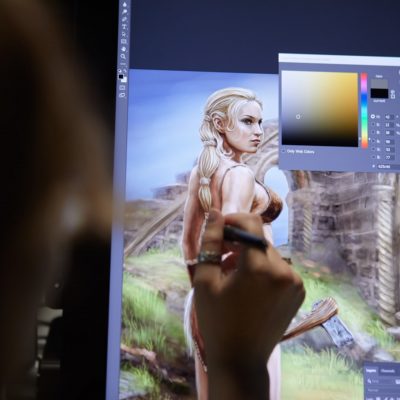
Games Art BA (Hons)
Our Games Art course is an introduction to the creative aspects of the gaming industry, giving...
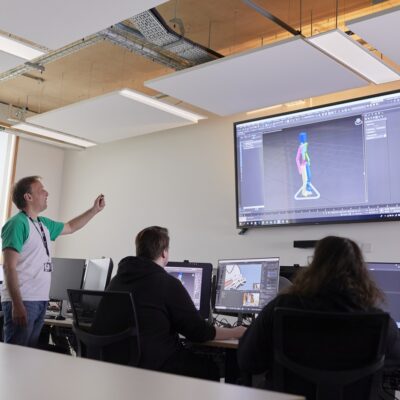
Games Programming BSc (Hons)
This course is designed in such a way as to provide students with all the knowledge...
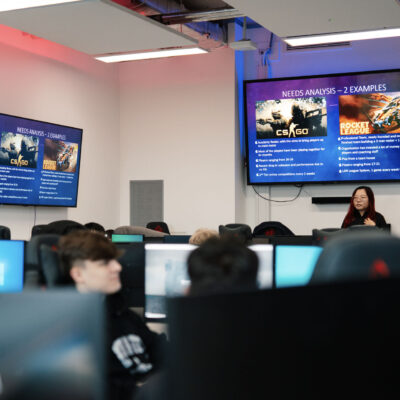
Esports BSc (Hons)
As an esports BSc (Hons) student, you will study disciplines around competitive live and on-line video...

Animation BA (Hons)
Our Animation BA (Hons) programme focuses on preparing students for a career in animation



